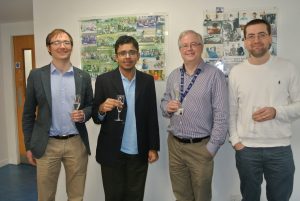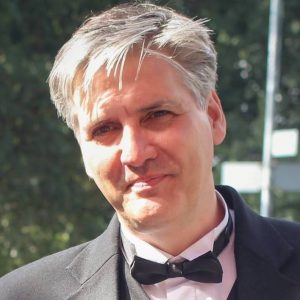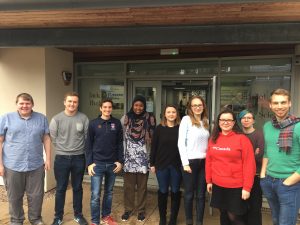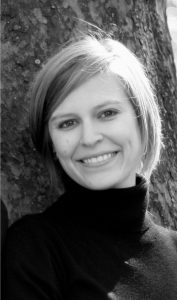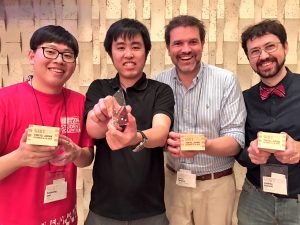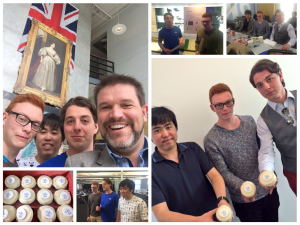Congratulations to Bilal Hussain, who successfully defended his thesis today. He is pictured below with supervisor Professor Ian Miguel, Internal examiner Professor Simon Dobson and external examiner Dr Peter Gregory, from Teesside University.
Children in Need 2016
SACHI Seminar: Roderick Murray-Smith, University of Glasgow
Title: Control Theoretical Models of Pointing
Speaker: Rod Murray-Smith, University of Glasgow
http://www.dcs.gla.ac.uk/~rod/
Abstract: I will talk about two topics:
1. (Joint work with Jörg Müller & Antti Oulasvirta) I will present an empirical comparison of four models from manual control theory on their ability to model targetting behaviour by human users using a mouse: McRuer’s Crossover, Costello’s Surge, second-order lag (2OL), and the Bang-bang model. Such dynamic models are generative, estimating not only movement time, but also pointer position, velocity, and acceleration on a moment-to-moment basis. We describe an experimental framework for acquiring pointing actions and automatically fitting the parameters of mathematical models to the empirical data. We present the use of time-series, phase space and Hooke plot visualisations of the experimental data, to gain insight into human pointing dynamics. We find that the identified control models can generate a range of dynamic behaviours that captures aspects of human pointing behaviour to varying degrees. Conditions with a low index of difficulty (ID) showed poorer fit because their unconstrained nature leads naturally to more dynamic variability. We report on characteristics of human surge behaviour in pointing. We describe trade-offs among the models. We conclude that control theory offers a promising complement to Fitts’ law based approaches in HCI, with models providing representations and predictions of human pointing dynamics which can improve our understanding of pointing and inform design.
2. Casual control. How and why we can design systems to work at a range of levels of engagement.
Biography: Roderick Murray-Smith is a Professor of Computing Science at Glasgow University, in the “Inference, Dynamics and Interaction” research group and the Head of the Information, Data and Analysis Section. He works in the overlap between machine learning, interaction design and control theory. In recent years his research has included multimodal sensor-based interaction with mobile devices, mobile spatial interaction, Brain-Computer interaction and nonparametric machine learning. Prior to this he held positions at the Hamilton Institute, NUIM, Technical University of Denmark, M.I.T., and Daimler-Benz Research, Berlin, and was the Director of SICSA, the Scottish Informatics and Computing Science Alliance. He works closely with the mobile phone industry, having worked together with Nokia, Samsung, FT/Orange, Microsoft and Bang & Olufsen. He was a member of Nokia’s Scientific Advisory Board and is a member of the Scientific Advisory Board for the Finnish Centre of Excellence in Computational Inference Research. He has co-authored three edited volumes, 22 journal papers, 16 book chapters, and 88 conference papers.
Event details
- When: 18th November 2016 13:00 - 14:00
- Where: Cole 1.33b
- Format: Seminar
Computer Science Student Reps 2016
We are delighted to congratulate the student representatives for 2016/7, elected by their peers. Reps play a very important part in the life of the school by providing a healthy communication channel between staff and the students they represent, and also by chairing and running the Staff-Student Consultative Committee, amongst many other roles.
The reps are shown outside the Jack Cole Building in November 2016, and are (from left to right)
- Juris Bogusevs (1st year)
- Seamus Bonner (1st year, library)
- Keno Schwalb (3rd year, careers)
- Christa-Awa Kollen (welfare)
- Vika Anisimova (4th year)
- Anastasiia Izmailova (2nd year, social)
- Masha Nedjalkova (masters, careers, minutes)
- Fearn Bishop (postgraduate research)
- Robin Nabel (school president)
Many thanks to the reps for arranging this photo (taken by Alex Bain who can be seen in the reflection), which should help staff and students put faces to the names.
Thanks to everyone who volunteered to be a student rep.
Job Vacancy: Research Fellow in Computer Science
A Research Associate position in analysis and verification of novel cache algorithms is available at the School of Computer Science within the University of St Andrews. The position is a fixed-term position for 18 months, starting January 2017 or as soon as possible thereafter. The project involves understanding and developing the theoretical basis for such algorithms, formalising them using formal techniques of theorem proving and/or model checking, and developing formal analysis and correctness proofs for such algorithms.
This is part of the EPSRC-funded “C3:Scalable & Verified Shared Memory via Consistency-Directed Cache Coherence” (EP/M027317/1) project, a collaborative project with architecture researchers at the University of Edinburgh and at Intel Corporation Ltd, investigating high-performance cache coherence protocols. Our goal is to propose and verify a family of protocols that are aware of high-level programming models, including in particular those with so-called relaxed memory consistency models.
The particular direction at St Andrews under the direction of Dr Sarkar is to develop verification methods that will scale to the research cache coherence protocols being co-developed within the project. This is a new application area for formal methods, with performance and correctness both equally important. Thus, a background in one or more of Formal Methods, Compilers and Static Analysis, and Verification Tools is expected. Software development and/or formal proof development experience is invaluable.
For an informal discussion about the post you are welcome to contact Dr Susmit Sarkar.
Applications are particularly welcomed from women and other groups that are under-represented in Research posts at the University.
DLS: Distributed Systems and Sensing by Prof. Julie McCann
DISTINGUISHED LECTURE SERIES
Semester 1
TITLE:
Distributed Systems and Sensing
by
Julie McCann
7th November 2016
Lower and Upper College Halls
Introduction
By Professor Simon Dobson
School of Computer Science
University of St Andrews
The first of this academic year’s distinguished lectures will be given by Professor Julie McCann, Imperial College, London on Monday 7th November 2016 at Lower and Upper College Halls.
Overview
Chirping, self-organising, adaptive and intelligent tiny computers are beginning to enter both the market and people’s homes, performing various monitoring and control duties. From Google’s self-drive cars to the walls of modern office blocks, these simple devices are talking to each other in highly intelligent ways, mimicking the collective behaviour of insect colonies, for example, to overcome individual failures or changes in the local environment.
Biography
Prof Julie A. McCann is a Professor of Computer Systems in Imperial College London (IC), where she leads the Adaptive Embedded Systems Engineering Research Group, she is Director for the Imperial wide Centre for Smart Connected Futures, Co-Director of the Intel Collaborative Research Institute for Sustainable Cities and she is CI for the NEC Smart Water Systems Lab and many other substantive projects with industry and academia with a focus on networking and sensing infrastructures to support environments such as smart cities, water and gas networks etc. She is CI on the EPSRC energy/water/food nexus WefWebs project where her focus is on precision farming and wine making.
Likewise, her NERC FUSE project designed and deployed a now patented sensing infrastructure for floodplain monitoring in Oxfordshire. Her research centres on highly decentralized and self-organizing scalable embedded frugal computing systems where one avoids a single point of failure to produce truly scalable solutions. She is a Fellow of the British Computer Society and is the Associate Editor for ACM Transactions on Adaptive Autonomic Systems (TAAS), has been General and Technical chair for the IEEE International Conference on Self-Adaptive and Self-Organising systems (SASO) and IEEE SECON 2016, SMARTCOMP 2017 and has been on the programme committee for IEEE INFOCOM, ACM UBICOMP and many more. Julie has presented her work in A* conferences and keynoted at the Indian Science Conclave Congregation of Nobel Prize Winners, for the encouragement of disadvantaged kids into science and computing in 2008.
|
Programme: Monday 7th November 2016 |
||||
|
09:15 – 09:30 |
Introduction: |
|||
| By Professor Simon Dobson | ||||
|
09:30 – 10:30 |
Lecture 1: |
|||
| Professor Julie McCann will initially talk through how Wireless Sensor Networks are being used today and what other sciences will impact this subject leading to the ability to have Programmable Matter. | ||||
|
10:30 – 11:00 |
Coffee Break |
|||
| Refreshments served | ||||
|
11:00 – 12:00 |
Lecture 2: |
|||
| In her second talk she will come very much down to earth and discuss how such systems are programmed today in terms of the hardware stack that composes them and the protocols that allow them to collaborate. | ||||
|
12:00 – 14:00 |
Lunch Break |
|||
| Free time | ||||
|
14:00 – 15:00 |
Lecture 3: |
|||
| Prof McCann will introduce some of the challenges that still remain, such as scaling this technology to larger dimensions but to also make them more resilient as well as secure etc. and the challenges that control adds to the system. | ||||
|
15:00 – 15:30
|
Q & A Session:
|
|||
| Open forum
|
||||
Event details
- When: 7th November 2016 09:15 - 16:00
- Where: Lower College Hall
- Series: Distinguished Lectures Series
- Format: Distinguished lecture
SACHI Seminar – Dr Rebecca Fiebrink: Goldsmiths University of London
Title: Designing Real-time Interactions Using Machine Learning
Abstract: Supervised learning algorithms can be understood not only as a set of techniques for building accurate models of data, but also as design tools that can enable rapid prototyping, iterative refinement, and embodied engagement— all activities that are crucial in the design of new musical instruments and other embodied interactions. Realising the creative potential of these algorithms requires a rethinking of the interfaces through which people provide data and build models, providing for tight interaction-feedback loops and efficient mechanisms for people to steer and explore algorithm behaviours.
In this talk, I will discuss my research on better enabling composers, musicians, and developers to employ supervised learning in the design of new real-time systems. I will show a live demo of tools that I have created for this purpose, centering around the Wekinator software toolkit for interactive machine learning. I’ll discuss some of the outcomes from 7 years of creating machine learning-based tools and observing people using these tools in creative contexts. These outcomes include a better understanding how machine learning can be used as a tool for design by end users and developers, and how using machine learning as a design tool differs from more conventional application contexts.
Biography: Dr. Rebecca Fiebrink is a Lecturer at Goldsmiths, University of London. Her research focuses on designing new ways for humans to interact with computers in creative practice, including on the use of machine learning as a creative tool. Fiebrink is the developer of the Wekinator system for real-time interactive machine learning (with a new version just released in 2015!), a co-creator of the Digital Fauvel platform for interactive musicology, and a Co-I on the £1.6M Horizon 2020-funded RAPID-MIX project on Real-time Adaptive Prototyping for Industrial Design of Multimodal Expressive Technology. She is the creator of a MOOC titled “Machine Learning for Artists and Musicians,” which launched in 2016 on the Kadenze platform. She was previously an Assistant Professor at Princeton University, where she co-directed the Princeton Laptop Orchestra. She has worked with companies including Microsoft Research, Sun Microsystems Research Labs, Imagine Research, and Smule, where she helped to build the #1 iTunes app “I am T-Pain.” She holds a PhD in Computer Science from Princeton University.
Event details
- When: 1st November 2016 14:00 - 15:00
- Where: Cole 1.33b
- Format: Seminar
Best poster award: Sidetap and Slingshot Gestures on Unmodified Smartwatches
Congratulations to Hui-Shyong Yeo, Professor Aaron Quigley and colleagues, who won best poster at UIST2016.
Their paper Sidetap and Slingshot Gestures on Unmodified Smartwatches, is available through the ACM digital library.
Royal Television Society Bursary: Henry Hargreaves
Congratulations to Henry, one of our second year students, who secured a Royal Television Society bursary. The bursary scheme is supported by a cross industry panel with senior representatives from Arqiva, BBC, BT, Channel 4, Fujitsu, Ericsson, Institute of Engineering Technology, ITV, Sky and Youview.
The new venture for the Royal Television Society, is intended to start to address a skills gap and attract some talented young people on top computer science or engineering courses to consider the option of a career in the broadcast industry. Further details of the scheme can be found here: https://rts.org.uk/education-training/technology-bursaries
Bursary recipients attend a two-week summer tour of the industry, spending a day in each of the 10 companies backing the scheme. A financial award per year for the three years of the bursary, membership of the Royal Television Society and mentoring or placements in their final year of study.
As an R.T.S Bursary recipient, Henry explained that he has not only benefited financially; helping towards my course at St Andrews but it has introduced him to career opportunities within the TV industry.
“I have gained a useful insight by participating in a range of activities organised by the RTS. These have really opened my eyes to how Computer Science plays a vital role in broadcasting, which I was previously, unaware of.”
RadarCat presented at UIST2016
SACHI research project RadarCat (Radar Categorization for Input & Interaction), highlighted earlier this year in the University news, the Courier and Gizmodo and in a Google I/O ATAP 2016 session, will be presented at UIST2016 this week.
RadarCat is a small, versatile radar-based system for material and object classification which enables new forms of everyday proximate interaction with digital devices. SACHI’s contribution to Project Soli featured in a previous blog post SACHI contribute to Google’s Project Soli, in May. Read more about RadarCat for object recognition on the SACHI blog.


